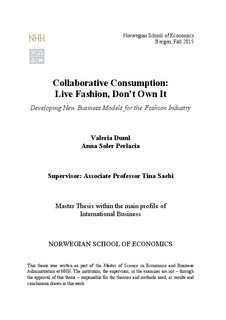Collaborative consumption : live fashion, don’t own it : developing new business models for the fashion industry
Master thesis
Permanent lenke
http://hdl.handle.net/11250/2382394Utgivelsesdato
2016-03-17Metadata
Vis full innførselSamlinger
- Master Thesis [4372]
Sammendrag
The rise of collaborative consumption is a phenomenon that appeared in many industries, such as in space sharing (e.g. Airbnb), car sharing (e.g. Uber), video streaming (e.g. Netflix), and more recently also in the fashion industry. This has prompted fashion companies to innovate their business models and start changing the way of doing business (e.g. Rent the Runway, Tradesy, and Vestiaire Collective). Through a qualitative and exploratory study based on a sample of twenty-six companies, this thesis describes the different business models that can be found in the novel industry of fashion-sharing. Hereby, the study proposes a ‘Four Elements Business Model Framework’, consisting of value proposition, customer segments, channels, and cost/revenue structure. Based on this framework, we identified three fashion-sharing business models archetypes (Fashion Rental Model, Swapping Model, and Second-hand Retailing Model) and several submodels for managers that want to engage in fashion-sharing. By conducting five indepth interviews with company founders of fashion-sharing businesses, we further identified their main motivations, inspirations, challenges, and future concerns. Key findings of our study points towards the importance of sustainability, changes in consumer mindsets, the shift in social values, and the increasing concern about overconsumption as main motivations to adopt fashion-sharing business models. Herewith, this thesis contributes to the existing literature of the collaborative economy by closing two important research gaps: defining different business model typologies in the fashion-sharing industry and analysing the particular motivations, inspirations, and challenges of implementing fashion-sharing business models.
